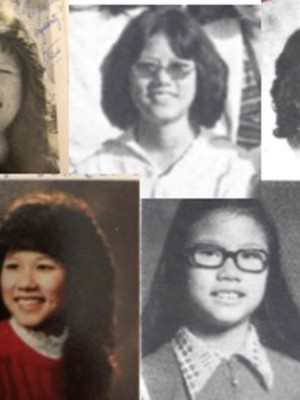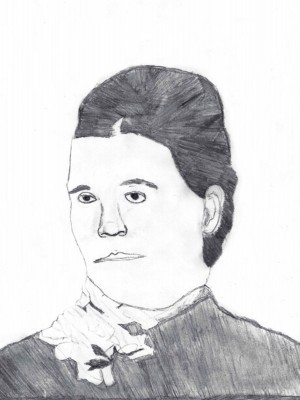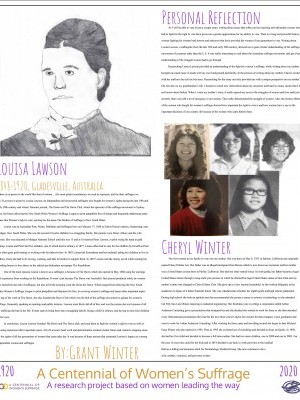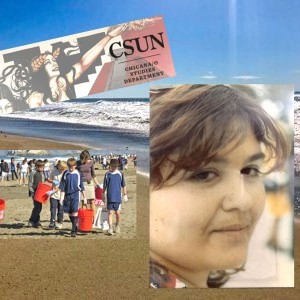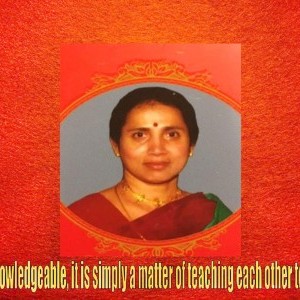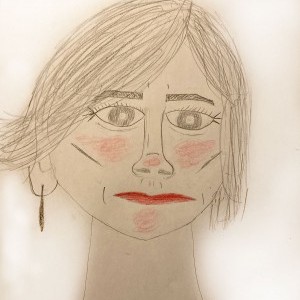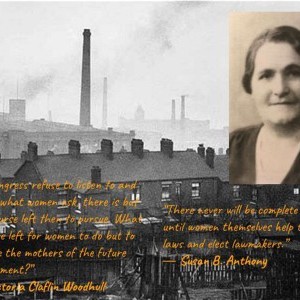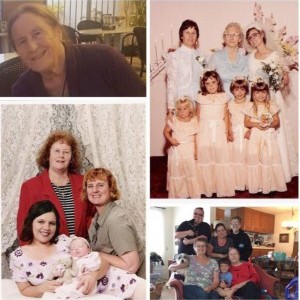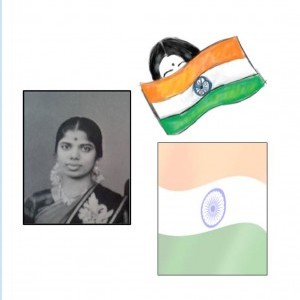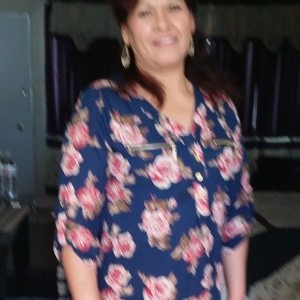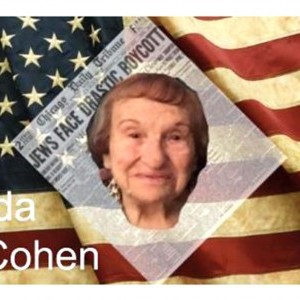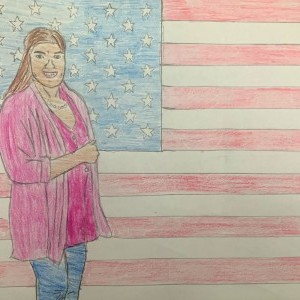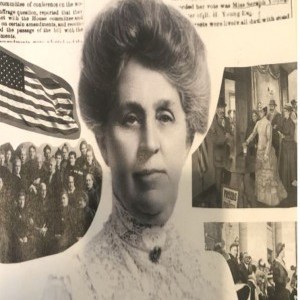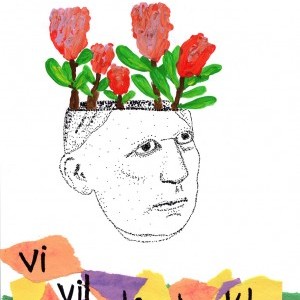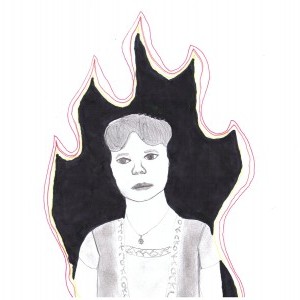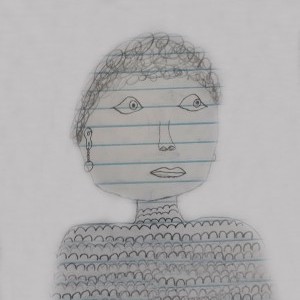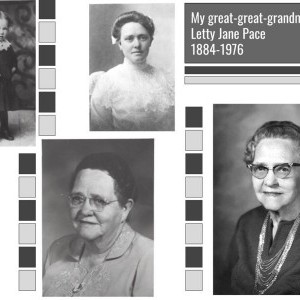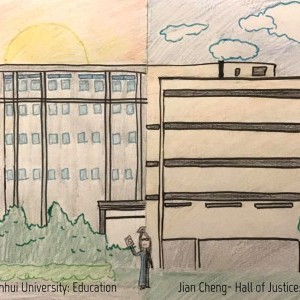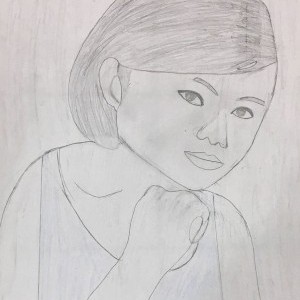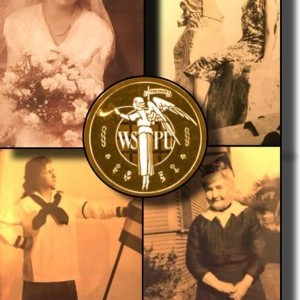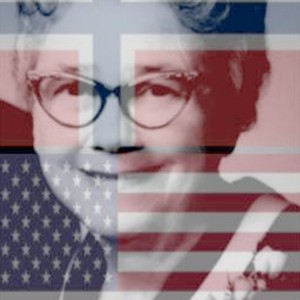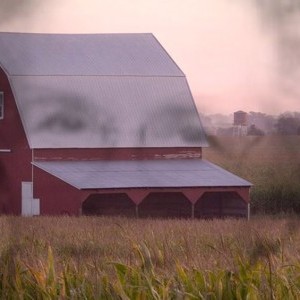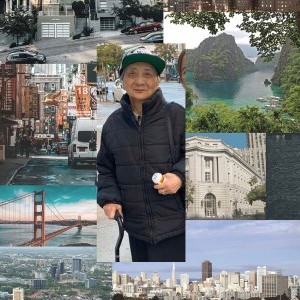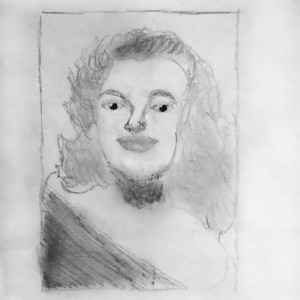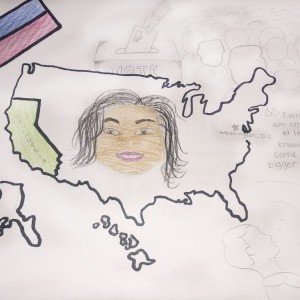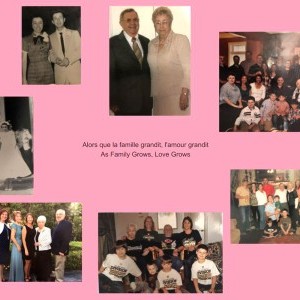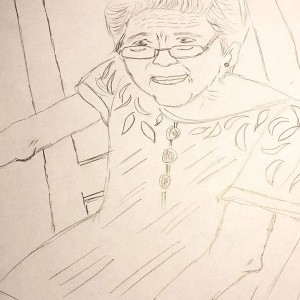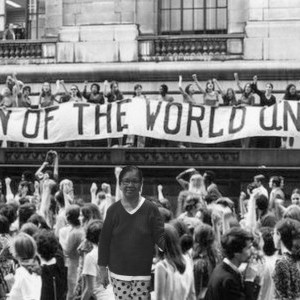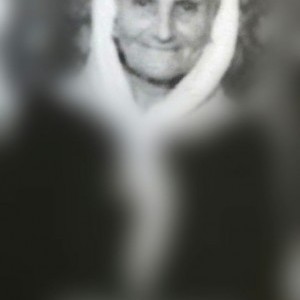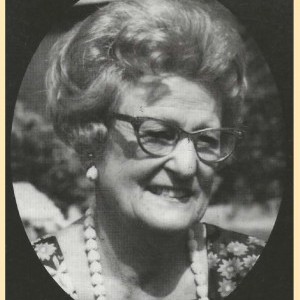Grant Winter
Adolfo Camarillo High School | Camarillo, CA | 10th
Inspirational Family Member
My Mom
The first woman in my family to vote was my mother, originally named Cheryl Elaine Len. Her father was an illegal immigrant from Burma, which is now known as Myanmar and her mother was a United States citizen born in Parlier, California. She had one sister named Joyce. In sixth grade, her father became a legal United States citizen through a long multi-year process in which he claimed his legal United States name as Don Chin and my mother’s name was changed to Cheryl Elaine Chin. She grew up in a low-income household, so she worked diligently at her academics in hopes of a better financial future. She was valedictorian at both her eighth grade and high school graduation. During high school she took an aptitude test that recommended she pursue a career in science or technology so she attended Cal Poly San Luis Obispo majoring in industrial engineering. Her freshman year in college, a corporation called Arthur Andersen Consulting gave a presentation that intrigued her and she decided she wanted to work for them so she then attended every informational presentation they had for the next three years to tailor her resume for that company.
Upon graduation she went to work for Arthur Anderson Consulting. After working for three years and travelling around she began to date Michael Gene Winter who she married in 1994. Then in 1995 she switched out of consulting and decided to focus on family. In 1996, she had her first child and decided to become a full time mother. She had two more children, one in 2000 and one in 2003. For the next 16 years she cared for her kids and in 2019 decided to go back to work part time in the medical field as a billing and insurance clerk for Dermatology Medical Group. She now continues to be a wife, mother, volunteer, and part time worker.
Historical Figure I Admire
Louisa Lawson
“There is no power in the world like that of women ... this most potent constituency we seek to represent, and for their suffrages we sue.” This is a quote by Louisa Lawson, an independent and resourceful suffragist who fought for women’s rights during the late 19th and early 20th century and whose feminist journal, The Dawn and whose meeting place, The Dawn Club, were the epicenters of the suffrage movement in Sydney. Also, The Dawn allowed the New South Wales Women’s Suffrage League to print pamphlets free of charge and frequently addressing many issues like women’s right to vote, earning her the name The Mother of Suffrage in New South Wales.
Louisa was an Australian poet, writer, publisher and suffragist born on February 17, 1848 in Edwin Rouse's station, Guntawang, near Mudgee, New South Wales. She was the second of twelve children in a struggling family. Her parents were Henry Albury and his wife Harriet. She was educated at Mudgee National School until she was 13 and at 18 married Peter Lawson, a sailor trying his hand at gold mining. Louisa and Peter had five children, one of which died in infancy in 1877. Louisa often had to care for the children by herself as Peter was often gone gold mining or working with his father-in-law. In 1883 Louisa left Eurunderee and her husband, taking her children to live in Sydney where she had to do sewing, washing, and take in boarders to support them. In 1887 Louisa used the money saved while running her boarding houses to buy shares in the radical pro-federation newspaper, The Republican.
One of the main reasons Louisa is known as a suffragist is because of The Dawn which she opened in May 1888, using her earnings and experience from working on the Republican. It wasn’t just because The Dawn was Australia’s first journal produced solely by women that earned her the title of suffragist, but also all of the amazing work she did at the Dawn. This ranged from allowing the New South Wales Women’s Suffrage League to print pamphlets and literature for free, to covering women’s suffrage and many other important topics. On top of her work at The Dawn, she also founded the Dawn Club which was the hub of the suffrage movement to agitate for women's suffrage, frequently speaking at meetings and public lectures. Lawson most likely did all of this, and was the person she was because of all the suffering she had in her life. Events such as being born into a struggling family, losing a child in infancy, and having to raise four children on her own.
In conclusion, Louisa Lawson founded The Dawn and The Dawn club, and used them to fight for women’s right to vote as well as covering numerous other important topics. All of Lawson’s hard work and determination created a better future and created a stepping stone for the rights of all the generations of women that came after her. It was because of these actions that cemented Lawson’s legacy as a strong independent woman and suffragist.
What the Project Means to Me
As I will be able to vote in just a couple years, writing these essays that reflect on the inspiring and influential women who had to fight for the right to vote have given me a greater appreciation for my ability to vote. There is a long and powerful history of women fighting for women both known and unknown that have provided the women of our generation the vote. Writing about Louisa Lawson, a suffragette from the late 19th and early 20th century, allowed me to gain a better understanding of the suffrage movement of countries other than the U.S. It was really interesting to read about the Australian suffrage movement, and get a better understanding of the struggle women had to go through.
Researching Louisa Lawson provided an understanding of the fight for women’s suffrage, while writing about my mother brought me much more in touch with my own background and family. In the process of writing about my mother, I had to sit down with her and have her tell me her story. Researching for the essay not only provided me with a unique perspective on my mother’s life, but also on my grandmother’s life. I learned so much new information about my ancestors and heard so many stories that I had not known about before. When I wrote my mother’s story, it really opened my eyes to the struggles of women and how until just recently, there was still a lot of misogyny in our society. This really demonstrated the struggle of women. Also, the tireless efforts of the women who fought for women’s suffrage showed how important the right to vote is and how women have a say in the important decisions of our country all because of the women who came before them.
Explore the Archive
More From This Class
Click on the thumbnails below to view each student's work.Deadline Extended
There's still time to join Women Leading the Way.
Become a part of our storytelling archive. Enroll your class today.
Join the Project

